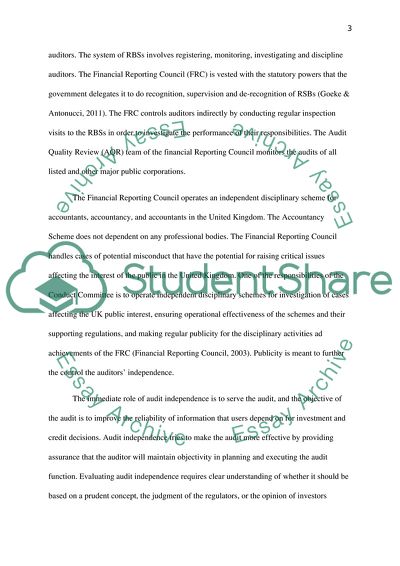Cite this document
(Auditors are well trained, professional people with a clear financial Essay, n.d.)
Auditors are well trained, professional people with a clear financial Essay. https://studentshare.org/finance-accounting/1812321-auditors-are-well-trained-professional-people-with-a-clear-financial-incentive-to-regulate-their-affairs-properly-so-they-should-be-left-alone-to-do-this-rather-than-be-subject-to-external-regulation
Auditors are well trained, professional people with a clear financial Essay. https://studentshare.org/finance-accounting/1812321-auditors-are-well-trained-professional-people-with-a-clear-financial-incentive-to-regulate-their-affairs-properly-so-they-should-be-left-alone-to-do-this-rather-than-be-subject-to-external-regulation
(Auditors Are Well Trained, Professional People With a Clear Financial Essay)
Auditors Are Well Trained, Professional People With a Clear Financial Essay. https://studentshare.org/finance-accounting/1812321-auditors-are-well-trained-professional-people-with-a-clear-financial-incentive-to-regulate-their-affairs-properly-so-they-should-be-left-alone-to-do-this-rather-than-be-subject-to-external-regulation.
Auditors Are Well Trained, Professional People With a Clear Financial Essay. https://studentshare.org/finance-accounting/1812321-auditors-are-well-trained-professional-people-with-a-clear-financial-incentive-to-regulate-their-affairs-properly-so-they-should-be-left-alone-to-do-this-rather-than-be-subject-to-external-regulation.
“Auditors Are Well Trained, Professional People With a Clear Financial Essay”. https://studentshare.org/finance-accounting/1812321-auditors-are-well-trained-professional-people-with-a-clear-financial-incentive-to-regulate-their-affairs-properly-so-they-should-be-left-alone-to-do-this-rather-than-be-subject-to-external-regulation.


